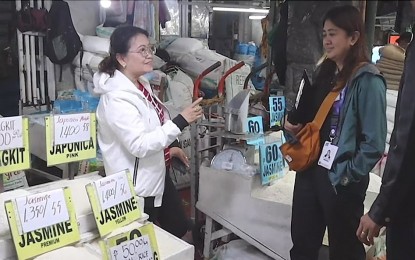
COMPLYING. Personnel from the the Department of Agriculture in the Cordillera Administrative Region (DA-CAR) monitor the compliance of rice retailers with Executive Order 39 mandating a price cap at the Baguio City public market in this undated photo. The DA-CAR said on Friday (Sept. 22, 2023) that at least 91 percent of rice retailers monitored in the region are compliant with the price ceiling. (PNA file photo)
BAGUIO CITY – The Department of Agriculture in the Cordillera Administrative Region (DA-CAR) said on Friday the region has logged a 91-percent compliance rate with Executive Order 39 which sets a price cap on rice.
“We have a 91-percent compliance based on the monitoring conducted by the Bantay Bigas task force,” Jennilyn Dawayan, regional director of the DA-CAR, said in a phone interview.
Data obtained from the DA showed that 136 establishments have been monitored –52 stalls at the Baguio City public market; nine at the La Trinidad, Benguet public market; 10 in Bangued, Abra; 20 in Luna, Apayao; nine in Lagawe, Ifugao; 19 in Tabuk City, Kalinga; and 17 in Bontoc, Mountain Province.
EO 39, signed by President Ferdinand R. Marcos Jr. and issued on Aug. 31, directed rice retailers to sell well-milled rice at PHP45 and regular-milled rice at PHP41.
Violators of the price ceiling can be penalized as provided in Sections 15 and 16 under Republic Act 7581 or the Price Act.
Penalties include imprisonment of up to 10 years and substantial fines ranging from PHP5,000 to PHP1 million.
Samuel Gallardo, assistant regional director of the Department of Trade and Industry (DTI), earlier said the next monitoring will already include municipalities in the six provinces and the two cities of the region.
Aida Pagtan, chief of the Regional Agriculture and Fisheries Information Service (RAFIS), in an interview on Friday at the DA-CAR office, said that based on reports, the supplies of well-milled rice come from Nueva Vizcaya and Isabela in Region 2, the rice capital of the country.
“The sellers only sell two kilos for every buyer so that the benefit of the low-priced rice will be made available to more people, especially the low-income families,” Pagtan said.
Dawayan further said experts on rice from the National Food Authority (NFA) are already training personnel from the DTI, DA, the Department of the Interior and Local Government (DILG) and other members of the “Bantay Bigas Task Force” on rice identification.
“Rice monitoring used to be with the NFA but was removed from them after the passage of the rice tarrification law but they were tasked as subject matter experts to train the members of the monitoring team,” she said.
Dawayan said the task force will continue its monitoring to ensure compliance by rice retailers.
“Compared to the initial days of implementation when we did not know because we were lacking in knowledge, we are now capable of identifying whether rice should be well-milled or regular-milled even if they are given a different name and priced higher than the ceiling of PHP45 and PHP41,” she added. (PNA)
